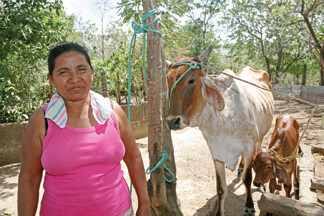
VIM team explores mission of accompaniment
LINDA WORTHINGTON
UMConnection Staff
 On Feb. 17 in Nicaragua, the Chevy Chase UMC Volunteers in Mission, worshiped at Iglesias de Christo in Barrio Nuevo, the mother church of an indigenous denomination started 50 years ago. It was Harvest Festival.
On Feb. 17 in Nicaragua, the Chevy Chase UMC Volunteers in Mission, worshiped at Iglesias de Christo in Barrio Nuevo, the mother church of an indigenous denomination started 50 years ago. It was Harvest Festival.
"You have come on a ministry of accompaniment," Ontoniel Cortez, son of the founding father, greeted us as accordions and guitars played.
The Rev. Dave Myers, pastor of Chevy Chase UMC, rose to preach. This was his 15th trip to Nicaragua since 1991.
At the end of the service, the bountiful harvest filling the altar area from floor to ceiling was distributed to all in the congregation. These "first fruits" (Deuteronomy 26 and Exodus 23:16) included bananas, pineapples, sorghum, melons, corn, papayas, mangoes, nuts, branches of Jamaica tea blossoms, coffee beans, and much more from the local farmers and members, many of whom were poor peasants.
"This festival represents the true meaning of bringing in the first fruits and sharing, sharing, sharing," Myers said.
Part of the memorable sharing on the VIM trip was meeting with missionary Nan McCurdy to visit the "Cows in Women's Hands" project, in Madronito, a small village in San Francisco Libre, without electricity or water. The village is home to 60 families, about 300 people.
Each of the six women who met us had received a $300 loan from Women in Community, a loan to buy a cow. The loan required the recipient to take training over the course of nine months and pay back the loan over three years at the rate of about $8 a month.
"It's a very big deal to get the loan," McCurdy said.
The women we met were part of the pilot project in 2005, and each cow had given birth to at least one calf. There are 44 women in several villages who now own cows.
It was unheard of that women, and not the man in the family, would own a cow. Each woman made a brand to mark her cow in her name. Each one spoke, through McCurdy as translator, with pride of her ownership.
"My household has really improved," said Francisca Hernandez. "I don't have to buy milk and cheese, and I've gotten more organized." 
She and others belong to a group called United Women, which makes high quality herbal medicines and natural shampoos. Selling the products provides the money she needs to pay back her cow loan. Some of the women make and sell fudge or a dessert from the milk.
"I had never had something like that cow that was mine," said Delores Padeya, so pleased with her accomplishment. And because of the training, she added, "I can counsel men who have cows."
Berta Padeya, on whose front porch we gathered, has a pregnant cow, which has already given birth to two calves (usually a calf a year). "My hope is to have a lot of cows so to help my children eventually," she said.
The women's relationships with their husbands have changed as a result of their newfound dignity and independence. They told of oppression and hopelessness, but the ownership of the cows has made life different.
"Now we know we can do things for ourselves – and men have a duty to help with housework. (My husband) can cook things. He shares housework with me," one said.
On the trip we also met Belinda Forbes, a dentist and United Methodist missionary serving Accion Medica Christiana, a charitable medical services agency, with 75,000 beneficiaries, most of them indigenous people.
In addition to caring for health needs, the group also advocates for the poor. "Poverty is an absence of power and inability to meet human needs," said Dr. Francisco Guitterez, AMC director.
The wealth gap is great in Nicaragua with only 10 percent of the population controlling 50 percent of the wealth.
Our group learned about many other programs in Nicaragua, including a visit to Little Snails pre-school, part of missionary Miguel Mairena's work, and the Carlos Mark Methodist Church and its feeding program for children in one of the poorest neighborhoods in Managua, a community the government had closed down because of destruction by an earthquake and hurricanes.
We learned about the programs to combat violence against women and children in San Francisco Libre; heard some of the history of warring Nicaragua; discussed the effects of globalization; visited the Martin Luther King Jr. University and the ecumenical seminary; visited an active volcano and swam in the Pacific.
Everywhere we were greeted with the utmost hospitality. "The warmth was incredible," said participant Nancy Moore. "People everywhere we met reached to brush our hands and hug us when we left."
It was a ministry of accompaniment.

Login/Register to leave comment